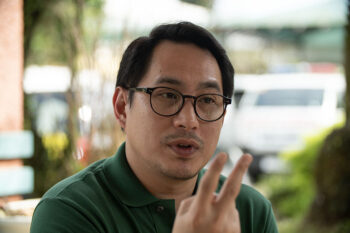II. More on the Police
GENERAL SANTOS CITY (MindaNews/07 May) — This piece is a continuation of two BBL comments – one, “On Deleted Provisions”, and the other, “Citizens’ Peace Council Tells Congress”. Of the first, we have discussed the “Police” provision; of the second, “the vision, mission, task and the general conclusion” of the Council. We are going to continue discussing the provisions set for deletion with the recommendations of the Council.
Third Opinion
Whatever any critic might say against it, the Citizens’ Peace Council has presented a third opinion by which to properly see the Bangsamoro Basic Law bill beleaguered in the Congress and to appreciate Bangsamoro, the autonomous political entity envisioned in the BBL to replace the existing Autonomous Region in Muslim Mindanao.* The bill is mired in questions of constitutionality, legality and acceptability with evident anti-Moro biases and prejudices.
*[To clarify the misunderstanding that Bangsamoro is unconstitutional because ARMM is what the 1987 Constitution explicitly provides to establish, “ARMM” and “Bangsamoro” are just different collars of the same dog – one of the two meant by “autonomous regions” to be created “in Muslim Mindanao and the Cordilleras” stated in Section 15 of Article X of the 1987 Constitution.]
The Council has set clear and objective criteria as its guide in studying the BBL and its controversial provisions – the “Key Objectives” and five interrelated propositions as the “Over-Arching Framework” for the Clusters to follow in their analyses. The validity of the third opinion rests on these criteria.
It should be asked: By what criteria have the congressional committees examined the constitutionality, legality and acceptability of the Draft BBL?
The Council’s third opinion should be seen as the arbiter between two opposing positions – those of AHCBBL Chair Rep. Rufus Rodriguez and of GPH Peace Panel Chair Miriam Coronel-Ferrer. Rodriguez maintained that the constitutional and legal defects of Draft BBL could not be remedied by mere re-phrasing or changing words in the text as Ferrer had suggested; the defective provisions must be deleted.
The question now is: To delete or to amend?
More on the Police
In media reports, certain sections of Draft BBL Article XI on “Public Order and Safety Police” were deemed unconstitutional for [1] putting the Bangsamoro Police under the operational, administrative and disciplinary control of the chief minister; [2] creating it as regional in scope for the primary purpose of law enforcement and maintenance of peace and order in the Bangsamoro; and [3] for requiring the Central Government to cooperate and coordinate with the Bangsamoro Government on military operations.
We compared corresponding provisions of Draft BBL and RA No. 905s4, the Organic Act of the ARMM, to show that there are no changes or just slight changes; or that significant differences are relevant to the more meaningful autonomy of Bangsamoro envisioned in Draft BBL.
What does the Council see and say?
First: The “[1]” and “[2]” in the first paragraph above are parts of the discussion of the Cluster on Human Security of “Article XI, Section 2” on “Bangsamoro Police”.
The Cluster pointed out:
- Section 2 “explicitly states that the Bangsamoro Police would be part of the Philippine National Police”.
- This explicit provision “has not stopped fears and speculations [first] about the police turning into their own army or [second] more recently about the possibility of those involved in the Mamasapano incident becoming part of the Bangsamoro police in the future.” The “fears” and “speculations” must have been fueled by the “primary purpose” and “regional scope” attributes of the Bangsamoro Police and its being under the “control and supervision” of the Chief Minister.
- There is a need to clarify “the calls made in the Senate that the provisions pertaining to the creation of the Bangsamoro Police does not make it distinct from the existing PNP but is rather a form of rebranding that is actually in consonance with current reform measures within the PNP, which seeks to clean up its ranks”.
The Cluster, to “clarify any such doubts of supervision”, suggested to amend Section 2 to read thus:
“Article XI, Sec 2. Bangsamoro Police. – There is hereby created a Bangsamoro Police which shall be organized, maintained, supervised and utilized for the primary purpose of law enforcement and maintenance of peace and order in the Bangsamoro. It shall be part of the Philippine National Police, in accordance with Chapter III of the DILG Act of 1990, R.A. 6975 as amended.”
The Cluster noted: “This additional clause could provide guidance to the Bangsamoro Parliament when it legislates the Bangsamoro Police Act, as provided in Section 12 of Article XI of the BBL.”
Second: The “[3]” in the first paragraph above is part of the discussion of the Cluster of “Relationship Between the AFP and the Bangsamoro” referring to “Article XI, Section 17” on “Coordination”, as stated: “A concern was raised that this entire section limits the ability of the AFP to respond and provide defense and security in the Bangsamoro if and when needed.”
The Cluster clarified that the “idea behind Section 17” is in the GPH – MILF Framework Agreement on the Bangsamoro and “is actually in line with the thrust of the existing Internal Peace and Security Plan (IPSP), which seeks to transfer internal security to the Police. Moreover, if the normalization goes well, the MILF would have ceased to become a threat”.
The Cluster continued: “Since the Bangsamoro Police is under the PNP, this provision should not be read as creating a relationship between the Bangsamoro Police and the AFP that is different from the relationship between the PNP and AFP, or that is very much different from peace and security coordination protocols currently in place.”
The suggestion is to amend the article by adding to the original text the clause in bold italics, to read: “Article XI, Sec 17. Coordination. – The Central Government and the Bangsamoro Government shall establish coordination protocols, which shall govern the movement of the Armed Forces of the Philippines in the Bangsamoro in such a way that the capability of the AFP to accomplish its duty and mission is not impaired.”
The Cluster also clarified “the creation of a Bangsamoro Command of the AFP (part of Section 15)” although it is not among the provisions played up in the media for deletion. The Bangsamoro Command is not “the creation by the Bangsamoro government of its own army” but that by the Central Government; and “if and when it is created …will still be under the AFP Chief of Staff and is similar to existing Commands in Mindanao such as the Western Mindanao Command”.
What is the Council saying? Section 2 and Section 17 of Article XI (so is Section 15) are not unconstitutional; they only need amendments to clarify.
Draft BBL Assertive
While adhering to RA 6975 as RA 9054 does, Draft BBL is more assertive of the autonomy due to Bangsamoro. It wants Bangsamoro to have more autonomy in the administration and control over its Police than ARMM has.
R.A. 6734 was passed on August 1, 1989. It provided for the creation of a Regional Police Force as part of the PNP under the administration and control of the Napolcom. That antedated the creation of the Napolcom under RA 6975 passed in December 1990; the ARMM started functioning in March that year. However, there was no mention or reference to the ARMM Regional Police in RA 6975. Neither was there mention or reference to this in RA 8551 that amended RA 6975 in February 1998.
In RA 6975, the participation of the provincial governors and of the city and municipal mayors is provided. The provincial governor has the power to choose the provincial police director and oversee the implementation of the provincial public safety plan. It is the city and municipal mayors who have the operational supervision and control over the police forces within their jurisdictions.
RA 9054 that amended RA 6734 in 2001 created the Regional Police Commission only stating in general its powers (XIII.10). It is under the administrative control of Napolcom; the Regional Governor’s only role is to appoint the chairman and members subject to confirmation of the Regional Assembly. The chairman becomes ex-officio commissioner of Napolcom “on matters dealing with the Regional Police Force”.
The city and municipal mayors under ARMM has more powers over the police forces under their jurisdictions than the Regional Governor over the Regional Police or the police forces in ARMM. Is that autonomy?
Besides adhering to RA 6975 by adopting provisions of RA 9054, Draft BBL proposes the creation of the Bangsamoro Police Board, not the Bangsamoro Police Commission. It “shall perform the functions” of the Napolcom in Bangsamoro with the functions enumerated. (XI.5) Draft BBL also enumerates the powers of the Chief Minister over the Regional Police which, under the organizational scheme (XI.4), includes the police forces in the cities and municipalities.
What does Draft BBL propose? The establishment of a Bangsamoro Police Organization that, while part of the PNP and under the Napolcom, is autonomous. Will the Congress relent from its opposition? That it created the Regional Police Commission in RA 9054 but will delete the Bangsamoro Police Board in Draft BBL speaks much of “autonomy” in the minds of the members of the Congress.
How we wish the Congress would deliberate on Draft BBL according to the criteria of the Citizens’ Peace Council!
[NEXT: On Constitutional Bodies]







